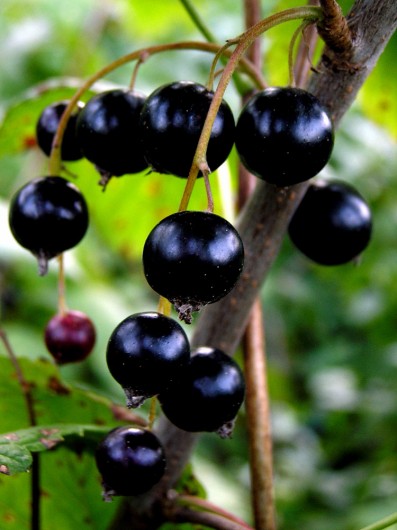Once Banned; Now Revered – Black Currants
The Wonder Fruit
Black currants grow in clusters on deciduous shrubs. Shiny and very deep purple (the deeper the more beneficial), the berries are harvested in August. Birds and bears in the wild feast on them. The black currant, somewhat tart, is considerably sweeter than the red currant. Black currants are used for pancake syrup, jellies and preserves, juice beverages, and even ice cream! The juice can be frozen safely for one year.
Black Currant Juice
Very popular in the United Kingdom and considered a health drink, black currant juice results from the berries, sugar, and water. Originating in Tibet, producing black currant shrubs spread to Europe, where they have been cultivated for 400 years. A French abbot, after listing the berry’s health properties in the 18th century, called this fruit a youth elixir! Once abundantly cultivated in the United States, the black currant carried the white pine blister rust fungus, then blamed for destroying pine forests. In the early 20th century, commercial cultivation of black currants was banned in the U.S. for several decades. In 1966, each state was able to decide whether or not to produce the berries, resulting in midwest and northeast cultivation.
Numerous Health Benefits
Drinking black currant juice is good for you! It contains 400% more Vitamin C, beneficial for hypertension, glaucoma, and heart disease, than orange juice! High concentrations of iron, organic acids, potassium, vitamin B5, phosphorus, and active plant phenolic compounds are also found in this fruit. Black currants are rich in fatty acids that regulate metabolism, reproductive processes, normal brain function, skin stimulation, and hair growth. Research shows that black currant nutrients also have favorable effects on arthritis, inflammation and the immune response. This fruit has twice the antioxidant power of blueberries. It is used for topical treatment of dermatitis and psoriasis. The juice is effective for upset stomachs and urinary tract infections. It helps maintain healthy kidneys. Its large concentration of vitamin A benefits eye health. 2006 Tuft’s University research, indicating that black currants may prevent or significantly delay Alzheimer’s Disease, has resulted in worldwide study of the fruit’s compounds. Side effects of soft stools, diarrhea, bloating, and belching have been reported by those taking black currant oil, perhaps due to the berry’s high fiber content.
Black Currant Juice Recipe
Boil 4 cups each picked currants and water. Simmer, covered, 10-15 minutes or until fruit softens, crushing berries several times to extract flavor. Using muslim, a sieve, or a jelly bag, drain juice into a pan. If you have a ricer, smashing the fruit with a pestle gleans more juice. Add 1 cup granulated sugar and 1/4 cup lemon juice; boil entire mixture over high heat. Pour into sterilized quart container(s), leaving 1/4 inch at the top, and process in a canner for 15 minutes, making the juice concentrate. When ready to serve, measure one part concentrate to 3-4 parts water or soda.
Interesting Facts About Black Currant
Greece began to export tiny dried seedless grapes, 1/4 the size of a raisin, in the 1920’s. During the first pier arrival, the Greek writing was translated as “currant” rather than “Corinth.” Since black currants were banned at this time, Americans became accustomed to cooking and baking with “currants” that are raisins in actuality.
More Articles On Black Currants And Black Currant Juice Juice
Best Blackcurrants For Blackcurrant Juice And How To Choose Them
Blackcurrants are packed with Vitamin C and the juice has …Blackcurrant Juice Side Effects – Can You Drink Too Much Of It?
The recommended dose of blackcurrent juice is 1.5 liters per …Blackcurrant Nutrition Facts
Blackcurrant Nutrition Facts Betaine 0 mg Calcium 61,6 mg Calories …The Amazing Health Benefits of Blackcurrant Juice
Black Currants are among the many berries that are very …
